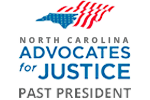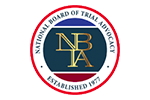YOUR LAWYERS.











Insurance Defense Lawyer – John Nunnally – Part 2
Insurance Defense Lawyer John Nunnally joins Law Talk with Bill Powers, discussing:
- The Practice of an Insurance Defense Lawyer
- Professionalism
- Trial Strategies
- Professional Development
My first seven years I was in Gastonia, so I was in Charlotte a lot, and I always thought Charlotte ran it very well. Although there definitely was the feeling of the great state of Mecklenburg compared to the rest of the administrative office of courts. But getting back to your original question, I do think lawyers are an administrative justice you want in important cogs. There’s a way when you’re handling a case, you can go into it adversarial, you can go into it looking for ways that you can reach a resolution. You’re never going to agree, but can you reach a common ground to allow the dispute to be resolved.
That’s an interesting approach. I see some attorneys, even on the defense side, in fact, probably especially on defense side, it’s almost a scorched earth. It’s the need to win versus a way to resolve the case. Just not sure that’s really beneficial if we get to the client, the company, the plaintiff, or any of the parties or the court system. I mean, I’m certainly prepared to take the case to trial if I need to, but there’s no reason that you can’t look for some way that it can’t be resolved.
That’s part of the reason I think mediation has been so successful with a good mediator who can listen for a long time and work on a problem. Hopefully you can resolve the case after the parties have had a chance to fully explore their issues and the case in chief. And know, when you sit down at mediation, it should be almost to the point of trial where you’re really ready to talk about it and hopefully see if there is a way to resolve it.
Bill Powers: Well, I’ll be honest with you. My view on mediation, at least the way I do it, and everyone has their own way of doing it, I treat mediation like a trial because I fully intend on settling it. To me, if we can’t settle at mediation, there’s really not a whole lot of extra work to do other than maybe practice on my narrative, or the issues, or focus on things that are more important to the case as opposed to what I may necessarily think that’s important.
John Nunnally: I don’t disagree, and that’s a good point. I try to take it in that approach too. I like, if we don’t settle the case at mediation and we go to trial, that you have risk on your… If you’re the plaintiff and I’m on the defense side. I hate when I have clients. I rarely have that now where we are of the type of cases I have, but early on, we didn’t want to offer anything or wanted to offer negligible amounts. There’s no downside on the plaintiff’s side at that point to taking the case to trial.
Why not take it to trial if you’re not going to make an offer? I want to make an offer that I think is fair and reasonable under the circumstances, and there’s risk on the plaintiff’s side if they try the case. So if we go try the case, it’s a situation where they have actually something to lose. And then give them something to think about before trying the case or deciding to take it to 12 people to decide their case. But that can get difficult. I mean, I won’t name individual insurance companies. You know who, obviously, who want to offer nothing or a dollar or something. And It’s like, “Well, you’re really making the plaintiff’s decision easy on that case. Roll the dice.”
Bill Powers: Yeah. I don’t know if I’ve ever got a dollar offer. I will say that when you do that, you’re baiting the person, for lack of a better term.
John Nunnally: No, that’s a good point. Yeah, you’re right. Why not? I mean, you’ve got… You just don’t know how it’s going to go in trial, what’s going to be allowed, and what’s not going to be allowed, and how people are going to do. But again, I mean, I want there to be some risk or downside. If you take the case to trial, you’re turning down an offer. I mean, and I get the theory that you don’t make an offer on every single case. I mean, otherwise you’re just encouraging lawsuits. However, those should be disposed of through motions if you feel that strongly about it. If you feel so strongly there’s no offer to be made, then go prevail on summary judgment.
Bill Powers: Right. You brought up the next point, actually, my next question for you. You have more than 75 jury trials. That is a just wow number. And so, that is incredible. We have a fair number of law students and people interested in the law that listen in to this. That is the pinnacle, the tip, if you will, of the iceberg, because to get to a jury trial, I can only imagine how many motions you’ve done, whether it’s a 1286 or some evidentiary issue. There must be thousands of depositions you’ve done, and hundreds of thousands of interrogatory questions you’ve posed.
With civil litigation, it’s not just a deposition. It’s not just interrogatory. You have requests for productions of documents. You have requests for [inaudible]. That’s a tremendous amount of background work. And, for me, my legal advice is predicated as much on the losses as the wins, and probably the losses have been more helpful in helping me decide whether I should take something to trial. I’ve done studies on this, actually, where they found that younger lawyers… And I don’t mean young in age. I mean, less experienced lawyers tend to be overly confident about how things are going to proceed at trial.
I describe it sometimes as, I see a younger lawyers picking up the tail of the snake, not understanding their fangs attached to the other end. What do you think the courtroom purpose is? And we talked on this a little bit, but some people think it’s a must, and something people think it’s something to be avoided at all cost. I think it’s somewhere in between. What are your thoughts?
John Nunnally: Yeah, I agree. It’s somewhere in between. I mean, you don’t want to say you’ll never go into trial. The problem I have now, as I’ve gotten older and more experienced, is I tend to just handle the really big cases, but the company type cases. So it is rare I take them to trial now. It’s funny though, like 75 plus trials I’ve done, most of those earlier in my career when there were a lot of auto wrecks, slip and falls, ones that were not betting the company type situations. Now I’ve taken some of those to trial, but in the last few years, I’ve probably tried three or four. It’s not as often.
I can remember one month, before I left my old firm, where I had a trial each week, one month, for four straight weeks. And that gets wearing on you because even a small auto wreck case still takes a lot of prep, as you know. I mean, you still have to go through the same motions, whether it’s a million-dollar case or a $10,000 case. There’s a lot of work involved in it.
Bill Powers: Sure. Sure.
John Nunnally: It definitely has a segued over, but yeah, I mean, it wasn’t like I looked just to take everything to trial. It was a matter where we’d made a fair offer under the circumstances. But I do want to get back to your point about the lawsuit. There is no question that in cases that I’ve lost, or things that have gone poorly, I have learned from. Those are the ones that have stuck with me, to not make that mistake again. And I have definitely taken that into trial.
There was one, I did a trial where I regretted how I did my closing. And I said, “I’m never going…” It was too apologetic, I thought. If I’m going to make the argument, make my argument to the jury and allow the chips fall where they may. And so, like two weeks later I had another trial and I did exactly that. It was a much more aggressive argument. And the judge and jury both were like, “Oh, that was such a convincing and compelling closing argument.” And since that time, I’ve done my closings like that continually.
It was interesting because if I hadn’t done that poor closing argument, would have I realized how I needed to shift and change my tactics? Probably not. I know one of my early briefs, I had not properly Shepardized the case that had been overruled like a week before. Now there’s not a case I file that I don’t double check the sites on anything I file now because I’m not going to go through that embarrassment again, of a case being wrong.
Bill Powers: John, I fear that’s old school Socratic [inaudible]. And I mean no insult to say this to anybody, but I don’t know how many people actually know what Shepardizing the case means anymore.
John Nunnally: True, true. Well…
Bill Powers: Just for the uninitiated, when the courts of appeals come out with opinions, sometimes they reverse other cases. And Shepardizing was a methodology when… And John and I are analog paper and pen people. We would go to books in the stacks in the library. That’s what we called the law library, where they had the shelves. And we would check to see if other courts had reversed or added to opinions. Now they do that, some of that, legal research companies will have a flag, meaning a red flag means it’s been reversed. Yellow flag means there’s some issues not clear. But yeah. There’s nothing like really being crashed and burned to teach you to look at your instruments and be careful.
John Nunnally: Well, like you said, it’s so easy now on the computer to check it. It just takes no time. Used to be going from book to book the book to make sure. Now it’s a simple matter of… And that’s back when I did mess up. But nowadays, there’s no excuse. It’s interesting. Sorry to get into too much legal lingo there.
Bill Powers: Oh, no, no, no, no. No, I think a lot of our listeners really like that. I know a lot about plaintiff’s lawyers, criminal defense lawyers, family law attorneys, but I know nothing or almost nothing about your professional world, at least the culture of your world. Is there a personality type or a skillset that is common to insurance defense?
John Nunnally: Yeah. It’s funny you say that, and I’ll go back to Campbell. When we did the trial advocacy program at Campbell, when we did our trials, and we each had to do a criminal trial and a civil, and I was actually plaintiffs on the civil trial. The judge, I don’t remember who it was now, who said at the time, after I did my closing, he said, “You know, you’d make a really good insurance defense attorney. You just are looking at it matter of factly, you’re not doing the passion, you’re not doing the…
Contact Us
- Free Consultation
- 704-342-4357
Personal Injury Law
- Drunk Driver Accidents
- Car Accidents
- Passenger Injuries
- Rear End Collisions
- Subrogation and Insurance Issues
- Bicycle Accidents
- Negligence is not an Accident
- Are Recorded Statements Required?
- Carolina Commercial Vehicle Accidents
- Accidents with Police Cars and Ambulances
- Contributory Negligence in North Carolina
- Discovery Sanctions
Client Reviews
I am so fortunate to have had Bill Powers on my case. Upon our first meeting, Bill insisted that through the emotions of anger, sadness, confusion, and betrayal that I remain resilient. He was available to answer questions with researched, logical, truthful answers throughout our two-year stretch...
I contacted over 20 attorneys and Bill Powers was the only one that got back to me and was willing to help. He was kind and professional. He helped me get answers that I have been trying to get for years. I am so thankful for all his help and would recommend him easily. Simply FANTASTIC.
Bill Powers contacted me very shortly after I submitted an inquiry. He is incredibly knowledgeable about laws and all the requirements in North Carolina. When working with him, he patiently answered any and all questions I had in great detail. I always had the feeling he was looking to help ME, and...
Let Us Help You!
- 1 Over 28 Years of Experience
- 2 Results Oriented
- 3 We Will Fight for You

